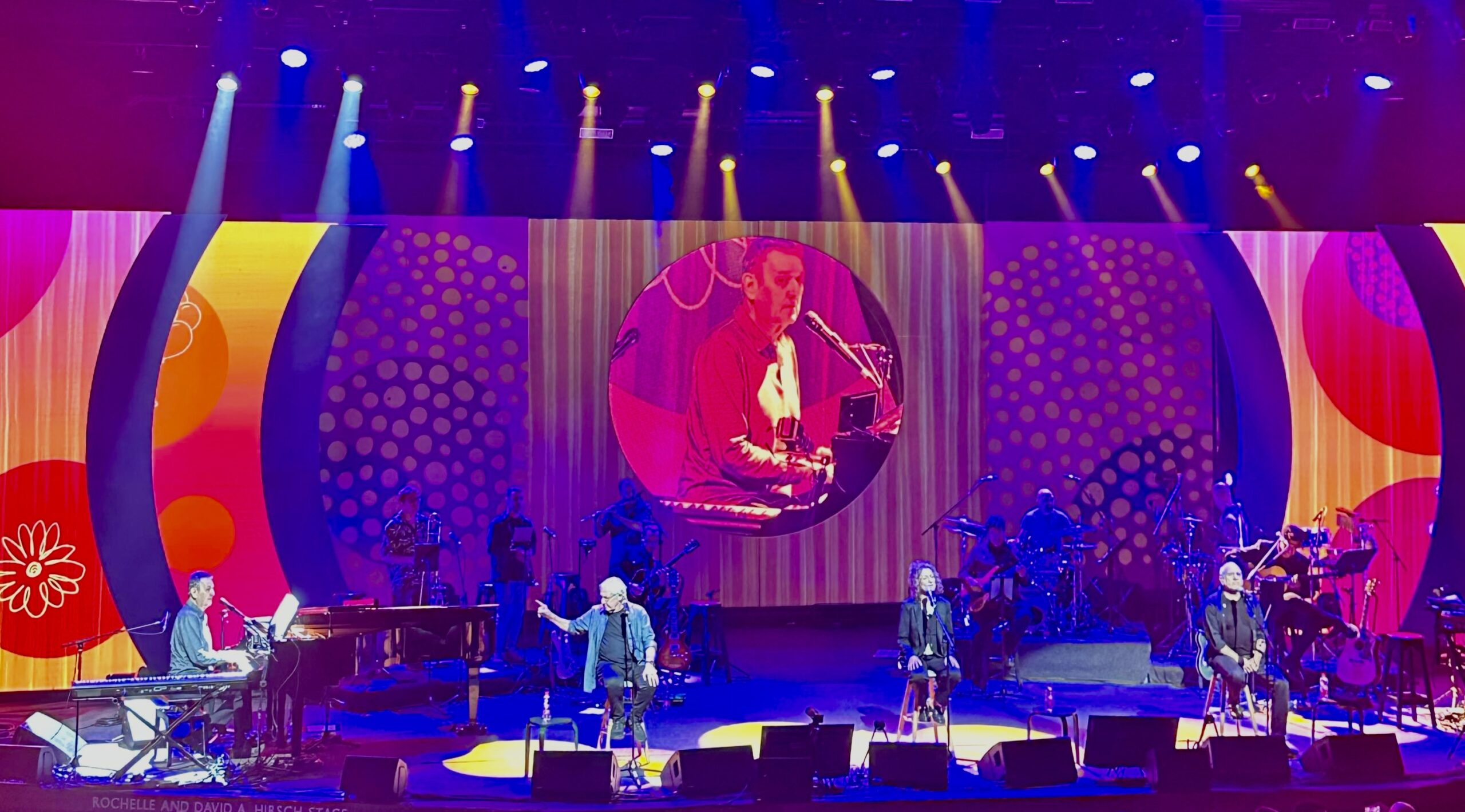There are almost no non-Israeli performers in Israel now. Whether due to fear of missiles, travel disruptions incurred by intermittent flights, or the compulsion to boycott Israel — entertainment is homegrown in that country these days.
Unsurprisingly, the 2025 Israeli concert calendar has been dominated by one traveling show in particular, already attended by 150,000 Israelis as of mid-July, (which in US terms is the equivalent of 5 million people). Its first iteration was held in January at a Tel Aviv concert hall. That evening sold out within minutes of tickets becoming available. New performances keep being added. Today, there have been more than 25 scheduled with more to come. The standing waiting list consists of 200,000 people.
The show, which one of the performers, David Broza, describes as a rock operetta, is based on one of the most popular Israeli albums of all time, Hakeves Hashisha, (The Sixteenth Sheep), a collection of songs for children written by Yehonatan Gefen with music mostly composed and arranged by Yoni Rechter, released in 1978. That year was a year of whiplash in Israel. It began with a brutal war with Lebanon and the PLO, then entrenched in Lebanese territory, and culminated in negotiations with Egypt that resulted in an historic peace agreement. The sounds of those songs raise the ghosts of a different era in Israeli history – an era in which the Prime Minister was both Israel’s first right-of-center premier and a leader in the peace process. It was also the year that the Israeli mass peace movement Peace Now was founded. The album itself became as essential to the Israeli national psyche as those two earth-shaking events.The songs transcended the genre for which they were written — several became national hits. And the cast, made up of Gefen, Rechter, Broza, Yehudit Ravitz, and Gidi Gov, comprised some of the biggest musical creators and performers in Israeli history.
Gefen, who died suddenly from a heart attack at the age 76 in April of 2023, was a unique figure in the Israeli cultural scene. He was the nephew of Moshe Dayan, one of Israel’s most controversial, celebrated, and decorated Chief of Staff of the Army and politician. Gefen’s children are pop star Aviv Gefen and filmmaker Shira Gefen (who is married to the famous fiction writer, Etgar Keret). He was not only an accomplished poet, playwright, lyricist, and performer, he also penned a column for a popular mainstream Israeli newspaper, Maariv, for forty-one years. And he was an outspoken leftist his entire life.
Gefen had an especially magical capacity for crafting children’s music, possessing a rare talent to write songs that addressed children with respect and endearment. Plans for this epic show had been percolating for twenty years, most of them while Gefen was still alive.
The lyrics are remarkably urbane for the genre: “It was just the most sophisticated and yet child-friendly poetry ever, something that the parents can share with their kids. It’s not like, oh, here’s my two-year-old baby, let him play and hear some stuff,” Broza observed in an interview about the show, “The poetry is adult. It treats the language with a lot of respect.
“It’s, I think, the most unique children’s album ever produced anywhere in the world,” he continued. “Of course, I don’t know all the world’s poetry, but nothing has come to my attention that is stronger. Maybe YellowSubmarine has parts that are like this, but to have a book filled with poetry, amazing images, written in a serious manner, looking a child in the eyes. It’s great, which is why I think today, four generations later, everybody relates.” In fact, the illustrations and graphics that flow across the stage behind the performers are reminiscent of The Yellow Submarine — thick and colorful, with a sense of playfulness (but without the hallucinogenic haze).
The first song is about the creative process and the birth of a song. “We’re so happy you came/Soon you’ll hear/Many songs you’ve already heard/Hi Moms/We’re about to begin/But first can you tell me/How is a song born? /Like laughter/It starts from within.”

The lightheartedness of the lyrics and the tone juxtapose rather violently with the mood in the country now.
Broza thought out loud in my presence about how it felt to bring the show back to life amid so much horror: “We just went by our compass. We rehearsed for a year. We’ve had some 50 years’ experience, each of us individually on stage. And our production company, our partners, booked the halls and sold the tickets. The frenzy started. Every show sold out within five minutes.”
I attended one of the concerts this past July. That evening’s show was held in the ancient amphitheater in Caesarea. The venue, once a roman theater now situated in a national park, is all that remains of the ancient city which had been the Capital of Roman Judea. Herod built the Caesarea theater in 25 BC on the coast of the Mediterranean, halfway between what are now Tel Aviv and Haifa.
National history was compounded by family history: I was surrounded by generations of families, my own included. I was with my Israeli cousin who sang the songs to her two children, now grown, when they were kids. Like others in the crowd, she knew every word and sang along. There were adult mothers and daughters holding each other and standing, swaying to the music, and kids swaying and singing too.
The day that I interviewed Broza, a few days after the Caesarea concerts, he was heading down the coast from Tel Aviv in the center of the country to Be’er Sheva in the south where they would play in an outdoor theater in a blistering heat that would hit almost 100 degrees. The crowd packed in nonetheless. Broza joked that the team would keep putting on performances “until we’re in wheelchairs…which is close.” (Yehudit Ravitz is the youngest at age 68; the others are 70 or older.) Sobering slightly he added that they will probably play for another year. This strikes me as the perfect show for this profoundly fraught time in Israel. The performers offer much more than entertainment or even distraction. They resuscitate a different version, a lost version, of Israeli identity.
In the first part of the show the group plays hits from the album together, but in the second part each performer returns to sing one or more of their signature hits, all of which are part of the Israeli cultural canon. At each performance the audience continues to sing along as they light up their phones and sway arm in arm. And like the audience, all of the performers join in to augment these signature songs. It’s like a chorus of Israeli musical history coming alive.
These are songs that have been in the Israeli lexicon since the 1970s and 1980s, but they take on new meaning in the harsh netherworld of 2025. The evening that I attended, Yehudit Ravitz inaugurated the second phase of the show with one of her most popular songs, Mila tov (A Good Word). She prefaces it with a plea for the hostages to come home quickly. The entire amphitheater sang collectively: “Even between narrow dirt paths/I always left an opening for hope/Even when love died/I dreamed of better days/Even on tropical nights of sleep/It’s often hard/But usually a kind word/Immediately does me good/Just a kind word/Or two, nothing more.”
Gidi Gov follows with Ayn Od Yom (There is No More Day): “War clouds are approaching/With the sound of terror and thunder/Birds are flying fast/Looking for another place to hide/And only one white cloud/Seeks to find a sign of a rainbow/And I think now/That it is possible, and this is the last autumn.”

“There are always wars,” Broza told me. “You have economic difficulties here just like in any other country. And then on top of that, you have the war and the failing governments and leadership. We can feel that failure in the air, as if it were a spice that we breathe in, and we try to manage despite all that. It’s very difficult…hostages…the fallen… the plight of the people of Gaza, the misery of a mother with children she knows she can’t protect. All these things amount to compounded trauma here. We are a people living through trauma. The people who come to our shows are people living through trauma.
“The most wonderful thing about this show is that it’s a magical pill that offers an escape for two and a half hours…I don’t think a single person in his right mind opens his phone to see what’s going on in the news while he’s standing in the audience…It’s timed so well. And the musicianship is brilliant… When the audience hears our harmonies, hears those familiar songs that they grew up with, with such an innocence to them, suddenly the audience members become again the versions of themselves that first heard those songs. So, it’s the DNA of our music that came out of the 70s and 80s. And it’s as good as it was then, if not better now.”
His own song, “Yiyeh Tov,” (It will Be Good), which for decades has been the background song of the struggling peace camp in Israel — with lyrics by Gefen, closed out the show I attended. The song was written to mark Anwar Sadat’s journey to Israel, which culminated in the peace treaty between Israel and Egypt in 1979. The lyrics reflect this:
“Governments and generals that split our landscape into “us” and “theirs”/When will we see the end? Here comes the President of Egypt, /How happy I was for his coming/Pyramids in our eyes/And peace in his pipe. /And we said, “let’s make peace and live like brothers” /And he said “sure, /Just leave the Occupied Territories….”
It was indeed fitting that the last line of the song was the last line of the concert “I look out my window and see a new day.”
The songs have an innocence to them, but the innocence of the country is long gone. The second half of the show elicits a feeling so powerful it seems almost like the audience is reaching out and trying to grab onto the air circulating in the summer night, to cling to something ungraspable, to make the innocence stand still. People sing along with every fiber of their being, with a yearning — either for nostalgia or for better days. I told Broza this. From the stage, he replied, he can’t tell exactly what or why the audience responds. He simply knows they are enraptured.

